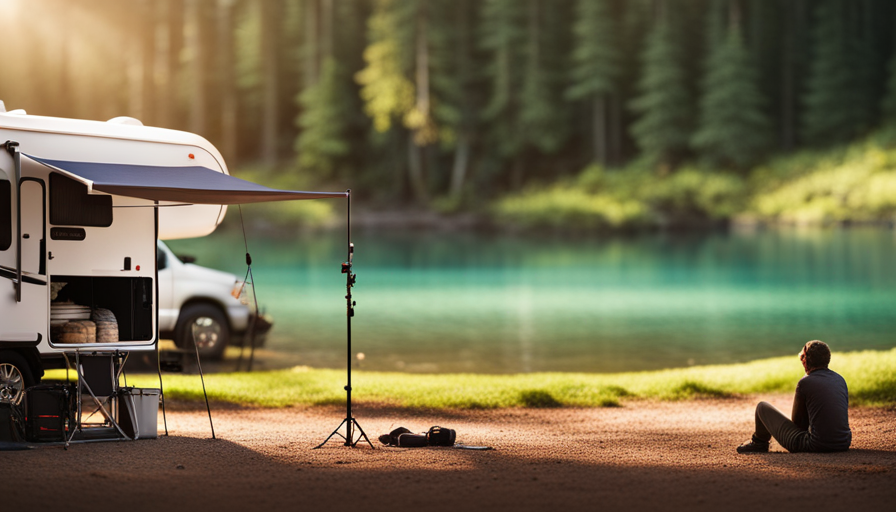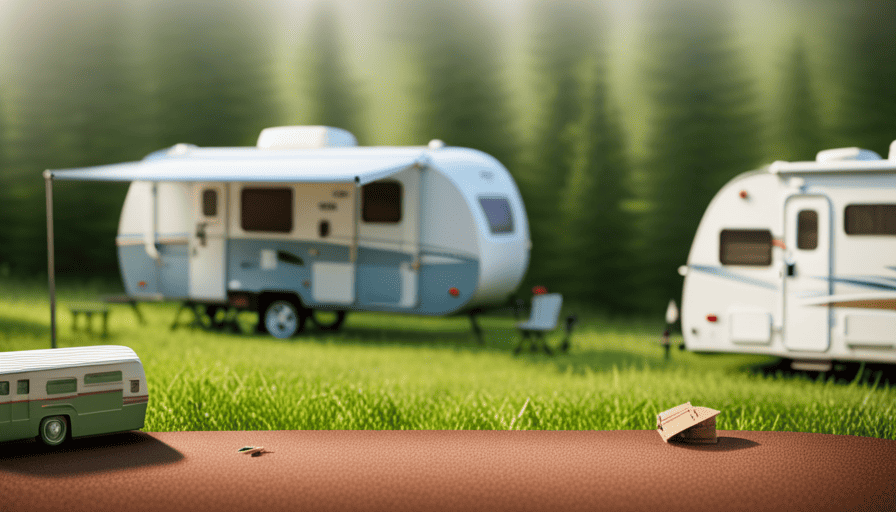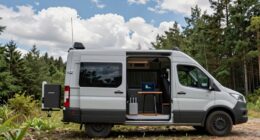Are you prepared to dive into the ultimate exploration?
Imagine this: limitless roads stretching out before you, awe-inspiring vistas, and the liberty to discover at the pace that suits you best.
Having a camper means you possess a mobile home, allowing you to forge lasting memories while embracing the wilderness.
However, with a plethora of choices available, picking the ideal camper can seem daunting.
But worry not, intrepid explorers, for we have your backs!
In this article, we’ll walk you through selecting a camper, making sure it aligns with your desires and needs.
From determining a budget to examining amenities, features, and even thinking about its future resale value, we’ve conducted the necessary research, so you’re spared the hassle.
Thus, fasten your seatbelts and prepare to venture out confidently, as we reveal the secrets to locating the camper of your dreams!
Key Takeaways
- Determine your needs and preferences before buying a camper, considering factors such as size, layout, amenities, and outdoor features.
- Set a budget and consider both purchase and maintenance costs, as well as financing options.
- Thoroughly research and inspect the condition of the camper, looking for signs of wear and tear, previous damage, and testing all appliances and systems.
- Consider factors that can affect the value of the camper over time, such as resale value, maintenance and repair costs, and availability of replacement parts.
Determine Your Needs and Preferences
So, what’s your ideal camper? When it comes to buying a camper, it’s important to first determine your needs and preferences.
Identifying key features that are important to you will help narrow down your options and ensure you find the perfect fit. Consider factors such as the size of the camper, the number of beds and bathrooms, and the layout of the living space. Determine essential amenities that you can’t live without, such as a kitchenette, air conditioning, or a bathroom. Think about the activities you plan on doing while camping and what features would enhance your experience.
For example, if you enjoy cooking, a camper with a well-equipped kitchenette might be a priority. If you plan on traveling with a large family or group of friends, you’ll want a camper with enough sleeping space and seating areas. Additionally, if you enjoy spending time outdoors, look for features like an awning or an outdoor cooking area.
Once you have a clear idea of what you’re looking for in a camper, it’s time to set a budget. Consider how much you’re willing to spend on both the purchase and maintenance of the camper. This will help you narrow down your options and ensure you stay within your means.
So, now that you know what you’re looking for in a camper and have set a budget, let’s move on to the next step of the buying process.
Set a Budget
When setting a budget for your camper purchase, it’s crucial to carefully consider your financial constraints and prioritize your must-haves. Setting financial limits will help you narrow down your options and prevent overspending.
Begin by assessing your financial situation and determining how much you can comfortably afford to spend on a camper. Take into account not only the purchase price but also ongoing expenses such as insurance, maintenance, and campground fees.
Once you have a budget in mind, it’s time to explore financing options. If you don’t have enough cash on hand, you may need to secure a loan. Research different lenders and compare interest rates and terms to ensure you get the best deal. Consider factors such as the loan term, monthly payments, and any additional fees. It’s important to choose a financing option that fits within your budget and allows you to comfortably make payments.
By setting a budget and exploring financing options, you can ensure that you make a financially responsible decision when purchasing a camper. Once you have a clear understanding of your financial limitations and potential financing options, you can move on to the next step and research different types of campers.
Research Different Types of Campers
Once you’ve set your budget and explored financing options, it’s time to dive into the exciting world of researching various camper types.
When it comes to different camper styles, there are several options to consider. One popular choice is the travel trailer, which offers a wide range of sizes and floor plans to suit different needs. They are towed behind a vehicle and can be detached at the campsite, providing flexibility for exploring the surrounding area.
Another option is the motorhome, which is a self-contained unit that includes living space and a driving compartment. Motorhomes come in various sizes, from compact Class B models to spacious Class A models.
Finally, there are camper vans, which offer a smaller, more compact option for those who prioritize maneuverability and simplicity.
Each type of camper has its own pros and cons. Travel trailers are generally more affordable and offer a greater variety of options, but they require a tow vehicle and can be more challenging to maneuver. Motorhomes provide the convenience of an all-in-one unit, but they tend to be more expensive and may require additional maintenance. Camper vans are compact and easy to drive, but they have limited living space.
Considering the size and layout of a camper is crucial in finding the right fit for your needs. This will be discussed in the next section, where we will explore how to choose the ideal size and layout for your camping adventures.
Consider Size and Layout
Imagine yourself stepping into the vast world of campers, where the size and layout of your chosen abode become the key to unlocking the door to your ideal camping adventures. When considering a camper, size considerations play a crucial role in determining your comfort and convenience on the road.
Will you be traveling alone or with a partner? Are you planning to bring along your furry friends or invite friends to join you? These questions will help you determine the appropriate size of your camper.
Additionally, consider the layout preferences that will best suit your needs. Do you prefer an open floor plan that allows for easy movement or separate rooms for privacy? Think about how you plan to use the space and what features are essential to you.
Now, as we transition into evaluating amenities and features, keep in mind that the size and layout of your camper will impact the availability and functionality of these options.
Evaluate Amenities and Features
As you explore the world of campers, you’ll be pleasantly surprised by the array of amenities and features that can transform your camping experience into a luxurious and convenient retreat. When evaluating pricing and comparing options, it’s important to consider the amenities and features that are most important to you.
Here are three key features to look for:
-
Kitchen facilities: A camper with a well-equipped kitchen can make your camping experience much more enjoyable. Look for features such as a refrigerator, stove, and microwave, as well as ample storage space for all your cooking essentials.
-
Bathroom facilities: Having a bathroom in your camper can greatly enhance your comfort and convenience. Look for features such as a toilet, shower, and sink, as well as a water heater to ensure hot showers are always available.
-
Sleeping arrangements: Evaluate the sleeping arrangements to ensure they meet your needs. Consider the number of beds, their size and comfort, and whether they can be easily converted into seating areas during the day.
When comparing campers, take note of the amenities and features each one offers and evaluate how they align with your camping preferences and budget. Once you’ve evaluated the amenities and features, it’s time to inspect the condition of the camper.
Inspect the Condition of the Camper
Now that we’ve evaluated the amenities and features of the camper, it’s essential to inspect its overall condition. Taking the time to thoroughly examine the camper can save you from potential headaches and costly repairs down the road.
To ensure a successful inspection, it’s helpful to have a camper inspection checklist on hand. This checklist should cover all the crucial areas, such as the exterior, interior, plumbing, electrical systems, and appliances.
When inspecting the camper, pay close attention to any signs of wear and tear. Look for cracks, dents, or rust on the exterior, as these can indicate previous damage or poor maintenance. Inside, check for any water stains, soft spots on the floor, or signs of mold or mildew, which could be indicative of leaks or water damage. Additionally, test all the appliances and systems to ensure they’re in good working condition.
By thoroughly inspecting the camper, you can have a better understanding of its overall condition and potential future expenses.
Once you’ve completed this step, it’s time to move on to the next stage of the buying process: researching and visiting dealerships or private sellers.
Research and Visit Dealerships or Private Sellers
Once you’ve thoroughly inspected the condition of the camper, it’s time to begin your search for reputable dealerships or private sellers to explore your options further. Conducting thorough research is vital to ensure you make an informed decision. Here are some research tips to consider:
-
Read reviews and testimonials: Look for online reviews or ask fellow campers for recommendations. This will give you insights into the reputation and reliability of the dealerships or sellers.
-
Compare prices and features: It’s important to have a good understanding of the market value of campers and their features. Visit different dealerships or browse through various online platforms to compare prices and features. This will help you negotiate better and ensure you get the best deal possible.
-
Visit multiple locations: Don’t settle for the first dealership or seller you come across. Visit multiple locations to get a broader perspective and see a variety of campers. This will allow you to make a more informed decision and find the perfect camper that suits your needs and budget.
Once you have conducted thorough research and visited different dealerships or sellers, it’s time to consider maintenance and repairs.
Consider Maintenance and Repairs
Consider caring for and fixing your future four-wheeled home by contemplating maintenance and repairs. When buying a camper, it’s important to consider the potential maintenance costs and repair options. Owning a camper comes with its fair share of responsibilities, and being prepared for these expenses is crucial.
Regular maintenance, such as oil changes, tire rotations, and inspections, can help keep your camper running smoothly and prevent costly repairs down the road. Additionally, it’s essential to research the availability and cost of replacement parts for your specific camper model. Some campers may have expensive or hard-to-find parts, which can impact the overall cost of repairs.
When it comes to repair options, it’s advisable to choose a camper that’s easy to repair and has accessible service centers. Having a camper that can be repaired locally can save you time and money in the long run. Furthermore, it’s worth considering extended warranties or service contracts that can provide additional coverage for unexpected repairs. These options can help alleviate the financial burden of major repairs.
Considering maintenance and repair costs is essential in making an informed decision when buying a camper. By factoring in these expenses, you can better assess the overall cost of ownership and determine if it aligns with your budget.
Next, let’s delve into the importance of considering resale value and depreciation when purchasing a camper.
Consider Resale Value and Depreciation
Thinking about the future, it’s important to keep in mind how the value of your potential four-wheeled home may decrease over time, leading to potential financial disappointment. When considering which camper to buy, it’s crucial to also evaluate its resale value and depreciation. Here are a few key points to consider:
-
Brand reputation: Choose a camper from a reputable brand known for maintaining its value. This will help ensure that when the time comes to sell, there is still demand for your camper.
-
Condition and maintenance: Regular maintenance and proper care can help preserve the resale value of your camper. Keep detailed records of all repairs and services, as this information can be valuable when negotiating the price with potential buyers.
-
Features and upgrades: Consider features and upgrades that can increase the resale value of your camper. Popular options include solar panels, upgraded appliances, and improved storage solutions.
By taking these factors into account, you can make a more informed decision about the potential resale value and depreciation of your camper.
In the next section, we will discuss the importance of seeking advice and recommendations when buying a camper, ensuring you make a well-informed choice.
Seek Advice and Recommendations
When it comes to making a big purchase like a camper, it’s important to consider all the factors that can affect its value over time. In our previous subtopic, we discussed the importance of considering resale value and depreciation.
Now, let’s move on to our current subtopic: seeking advice and recommendations.
One of the best ways to make an informed decision when buying a camper is to seek advice from trusted sources. Whether it’s friends, family, or online communities, hearing about other people’s experiences can provide valuable insights. They can share their personal experiences with different camper models, brands, and features, giving you a better idea of what to look for.
Online forums and social media groups dedicated to camping and RVing are great places to connect with fellow enthusiasts and gather advice. You can ask questions, read reviews, and even find recommendations for reliable dealerships or sellers.
Additionally, don’t forget to visit RV shows and expos, where you can talk to industry experts and see a wide range of campers in person.
By seeking advice and recommendations, you can tap into a wealth of knowledge and expertise that will help you make an informed decision when buying a camper. So don’t hesitate to reach out to others and learn from their experiences. Happy camping!
Frequently Asked Questions
What are some common mistakes to avoid when buying a camper?
When it comes to buying a camper, there are some common mistakes that we, as experienced buyers, know to avoid.
One of the biggest pitfalls is failing to thoroughly research and inspect the camper before making a purchase. This can lead to buyer’s remorse down the road when unexpected issues arise.
Another mistake to steer clear of is not considering your specific needs and preferences, as this can result in choosing a camper that doesn’t meet your requirements.
By being knowledgeable and informed, you can avoid these common pitfalls and make a camper purchase that you’ll be happy with for years to come.
Are there any specific safety features to look for in a camper?
When it comes to camper safety, it’s important to prioritize certain features. Look for campers that comply with camper safety regulations and have undergone thorough camper safety inspections.
These inspections ensure that the camper meets the necessary safety standards and is in good condition. Additionally, consider features such as fire extinguishers, smoke detectors, and carbon monoxide detectors to further ensure your safety on the road.
Taking these precautions will give you peace of mind while enjoying your camper adventures.
How can I determine the fuel efficiency of a camper?
When determining the fuel efficiency of a camper, we need to calculate its mileage and consumption. To do this, we should consider key factors such as the weight of the camper, engine type, and aerodynamics. These elements greatly affect fuel consumption.
Additionally, we should take into account the camper’s size and whether it has any energy-saving features. By considering these factors, you can make an informed decision about the fuel efficiency of a camper before making your purchase.
Are there any legal requirements or restrictions for using a camper?
When it comes to using a camper, there are some legal requirements and restrictions that you need to be aware of.
Firstly, you should ensure that your camper meets all the necessary safety regulations and is roadworthy.
Additionally, you will need to have proper insurance coverage for your camper, including liability and collision coverage.
It’s important to familiarize yourself with the specific legal requirements and restrictions in your area to ensure a safe and legal camping experience.
What should I do if I encounter problems with my camper after purchasing it?
If you encounter problems with your camper after purchasing it, there are common solutions to consider.
Firstly, assess the issue and determine if it’s something you can fix yourself. Many camper problems can be resolved with basic troubleshooting and DIY repairs.
If the problem is more complex, it’s advisable to find reliable repair services specialized in campers. Look for experienced professionals who can diagnose and fix the issue efficiently, ensuring that your camper is back in top shape.
Conclusion
In conclusion, when searching for the perfect camper, we must carefully consider our needs and preferences. We should set a budget and research different types, sizes, and layouts. We should also evaluate amenities and features, and visit dealerships or private sellers. It’s important to contemplate maintenance and repairs, as well as future resale value and depreciation. By seeking advice and recommendations, we can make an informed decision.
So, let’s embark on this exciting journey of finding our dream camper, where adventure and relaxation meet!










